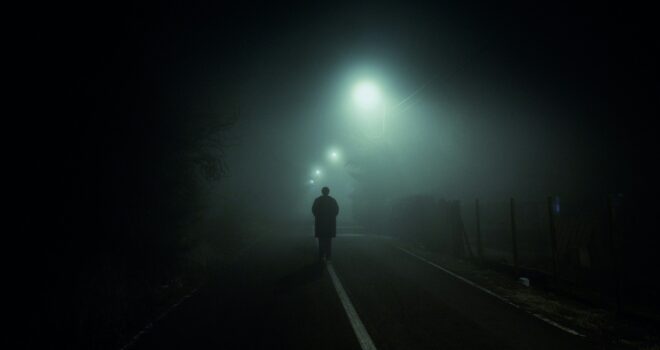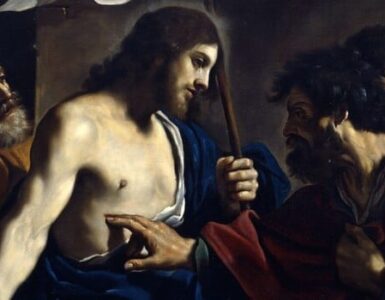Fr. Paul Mankowski, SJ, is a man you should have known. He was a man that everyone should have known because he changed the lives of the people who knew him for the better. He was a gift to us from God during this era of confusion and outright heresy. I am convinced that the Church would be in much better shape right now had his voice not been silenced.
Fr. Mankowski was a Jesuit from the Chicago province. He was authentically brilliant—not in the way that we throw the word around, but in its literal sense. He was a Biblical Scholar who had read and studied scripture in its original languages. He taught those languages to men who were on their way to becoming priests. He spoke a dozen or so languages, half of them dead.
Perhaps this background would prevent you from ever wanting to sit next to the man at the dinner table, but he was also the funniest person I have ever known—I, a television writer, who spent years in rooms with professional comedy writers. He could talk to you about football or bass fishing as easily as he could conjugate ancient semitic verbs. He was one of those people who made me feel like God was showing off when weaving him together.
In 2007—the year that I met him—Fr. Jankowski was officially silenced by his Jesuit order. After that point he was no longer allowed to write or speak on anything other than his area of expertise. I probably don’t have to tell you that there isn’t a great demand for keynote speakers on Aakadian loanwords in Biblical Hebrew. There aren’t a lot of mainstream Catholic magazines looking for articles from philologists either, so Fr. Mankowski’s voice was essentially erased from the world by one action. Every gift that God had given to Fr. Mankowski—and they were legions—was taken away from His people.
What horrible thing did Fr. Mankowski do to merit such draconian measures?
I encourage you to do the research (the truth is out there) if you don’t want to take my word for it because, if you don’t know much about the Jesuits, my answer will seem incredible.
In truth, Fr. Mankowski was silenced for boldly proclaiming the 2000+ year-old Magisterium of Holy Mother Church.
In worldly terms, he was silenced for political incorrectness—for speaking out against the ways in which the Jesuits were at odds with the teachings of the Church. He proclaimed and supported Church teaching on life issues, on marriage, on sexuality, on all hot button issues.
His number one crime, and the one that caused the Jesuits to formally silence him, was that he contributed to an article that detailed the underhanded way in which a Jesuit named Robert Drinan became a congressman. Something that is not only against canon law but would have drawn a loud “NO!” from St. Ignatius of Loyola, the founder of the Jesuits, who had written into the Jesuit constitution a clause forbidding Jesuits to seek office in the Church, which is easily extrapolated into political office. St. Ignatius famously declared ambition to be “the mother of all evils.”
Drinan ended up being elected and served in congress for a decade. His career ended when Pope Saint John Paull II ordered him not to seek re-election. The fruits of Drinan’s career are evil to an unfathomable degree. Aside from his passionate support of pro-abortion legislation, he also made a trip to Hyannis Port to sit down with the Kennedy brothers and explain to them that they could be personally opposed to abortion without imposing their beliefs on other people—a move that allowed Catholics to vote for the Kennedys while they were openly flaunting Church teaching. The excuse that Drinan provided became the excuse Catholics use—even to this day—to justify voting for pro-abortion politicians. Only God knows the number of abortions that can be chalked up to Robert Drinan.
Nevertheless, the Jesuits were quite proud of their Jesuit congressman, so when Fr. Mankowski outed the shenanigans by which Drinan was able to run for congress, they lowered the boom on Mankowski and took his voice from the world.
The document by which they silenced him can be read in my book, The Sound of Silence: The Life and Canceling of a Heroic Jesuit Priest (Sophia Institute Press, 2024.) The book is a memoir of my long friendship with Fr. Mankowski and the story of what he suffered at the hands of the Jesuit order.
But Fr. Mankowski’s punishment did not end with his silencing. As I detail in the book, he also endured years of being, as he described it, a pariah in his community. A man who had purposefully joined an order that came with a community was now on his own surrounded by men who hated him—men who were supposed to have been his brothers.
As if that weren’t bad enough, these men also set out to make him miserable so that he would leave the Jesuits. He was assigned to jobs far beneath his skill level or to those that were decidedly unenjoyable. Thus, a man with advanced degrees from Harvard and Oxford was assigned to teach Latin at an inner-city high school where, according to him, he spent most of his time writing hall passes.
Since he took his vow of obedience seriously, Fr. Mankowski went anywhere the Jesuits told him to go. Because of this, he found himself in Jordan during the height of the Arab Spring, saying Mass for the Filipina nannies of rich families.
When even that did not make him quit, they brought him back to Chicago, at which point they presented him with, in his words, “a lovely severance package” and a speech about how easy they would make it for him to quit. They wanted him to choose to jump ship because he had enough fans in high places (Pope JPII was one) that prevented them from kicking him out. When presented with this option, Fr. Mankowski informed the Jesuits that he had taken a vow to live and die as a Jesuit, and he had every intention of keeping that vow.
At this point they finally relented and let him work for the Lumen Christi Institute at the University of Chicago as the scholar-in-residence—a job for which he was well-suited. He worked there happily until his death in 2020. He was felled not by COVID but by an aneurysm. I believe, as do many of his friends, that it was brought on by the stress under which the Jesuits had forced him to live.
He was 66 years old when he died. While it is true that the Jesuits rendered him an unknown when he should have been, I believe, our generation’s Bishop Fulton Sheen, the good news is that Fr. Mankowski is having the last laugh. A man like Fr. Mankowski makes extremely loyal friends, and we are now writing and editing books that make his unpublished works finally available for the world. There are also collections of articles that he was able to publish before he was silenced (Jesuit at Large by George Weigel) and articles that he had to write under a pseudonym (Diogenes Unveiled by Philip Lawler).
Fr. Mankowski is now getting the attention that the Jesuits denied him in life, and they are being outed for the atrocious way they treated him. This outpouring of Fr. Mankowski’s work and the attention that he is now receiving is, as St. Ignatius would tell you, for the greater glory of God.
Editor’s Note: This author’s book The Sound of Silence is available from Sophia Institute Press.











